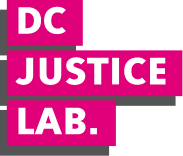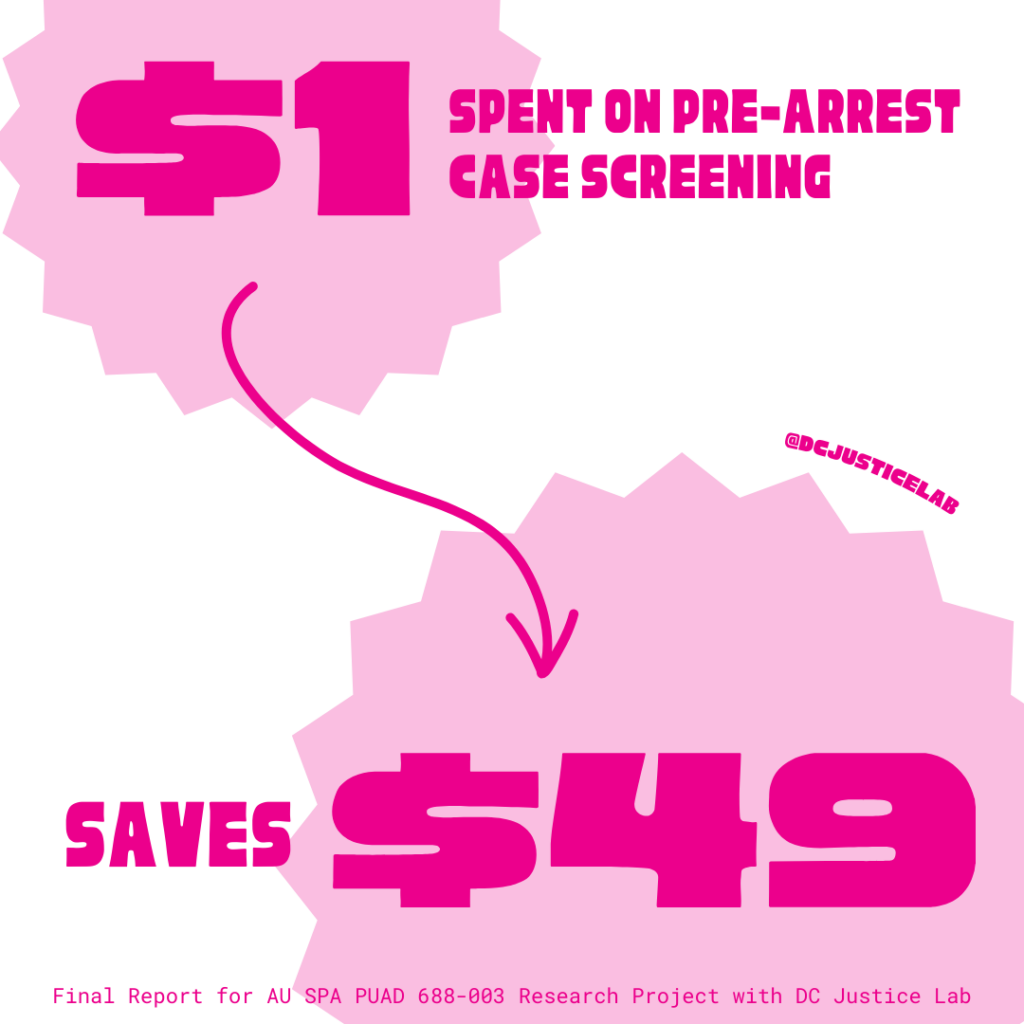once an individual is arrested, they are put into a police vehicle.

Case screening
Pre-charge case screening by prosecutors can avoid the negative consequences of an arrest.
- 6 Minute Read
Some people arrested by police in DC are not charged with a crime, but that person can still be each person is nevertheless handcuffed, booked, detained overnight, transported to three different locations, interviewed, and drug tested. An arrest can have negative consequences for someone’s long-term safety and stability. Charging decisions and alternatives to criminal prosecution can and should be considered earlier in the process. The United States Attorney for the District of Columbia should follow the lead of the Office of the Attorney General (OAG), and the justice systems in Houston and El Paso, Texas, and develop a pre-arrest case screening hotline where police and prosecutors can review the evidence earlier, direct investigations, and recommend interventions for the person who was arrested and the person who was harmed.

What you need to know
An arrest may not ultimately lead to a charge but still carries negative consequences.
After a person is arrested, it is up to the prosecutor to decide whether they will be charged with a crime. Custodial arrests involve significant consequences even when a case is not charged (“no papered”). The person may be shuttled between police stationhouses, held at the central cellblock or the courthouse basement, and the individual is photographed, fingerprinted, swabbed for DNA, and subjected to drug tests. After a person is arrested, they may be interviewed by the Pretrial Services Agency, a court-appointed attorney, and their families and employers may be notified of the arrest. An arrest record is created, and unlike most states, it can be difficult or impossible to seal a record of a non-conviction in DC. Only after all of those steps are completed will the United States Attorney for the District of Columbia decide whether to pursue criminal charges or another course of action.
they are then transported to one of the 8 district station houses.
At the station houses, the individual is searched, photographed, fingerprinted, and swabbed for DNA before being placed in a cell.
If not Released, MPD drives the person to Central Cell Block, operated by the DC Dept. of Corrections.
US Marshals then transport the individual to the courthouse basement next door.
The Pretrial Services Agency drug tests and then interviews the individual, contacts their family and employer reviews their criminal history, performs a legal analysis, an creates a report on whether the individual should be released.
The Public Defender Service assigns an attorney from their office of Criminal Justice Act panel to interview the individual, contact their family and employer, research the law, review the PSA employee’s report, and prepare arguments for why they should be released.
The prosecutor announces whether they are going to bring charges.
Case screening reduces recidivism, builds rapport with witnesses, and leads to stronger cases.
With round-the-clock case screening, police and prosecutors work together to process critical steps before an arrest. The police communicate with prosecutors, review the encounter, discuss whatever evidence exists of a crime, and determine whether the person should be arrested. Case screening also gives prosecutors and police the chance to identify whether a person needs to be diverted to a treatment program or should receive other assistance outside of the justice system, which reduces recidivism. Case screening can also help prosecutors build a rapport with witnesses and recommend services for victims. Case screening also creates opportunities to educate officers on why a formal charge will not be laid, reducing frustration around how cases are handled and allowing prosecutors to spot patterns of police misconduct.
Case screening in Texas communities with fewer tools than DC has shown effectiveness.
In Harris County (Houston), Texas, there are prosecutors on duty on a 24-hour basis working with police to review cases that should be accepted, rejected, investigated further or recommended that someone be diverted to a treatment program. El Paso, Texas, uses a similar case screening approach. Researchers who evaluated the approach in both Texas communities said case screening resolved cases faster, improved the quality of filed cases, and reduced the number of people detained in jail pretrial. In 2006, 19 percent of all cases were reviewed and rejected for insufficient evidence in El Paso, and an estimated 10 percent were reviewed and rejected in Houston. The models used in Texas should be easier to implement in DC. Unlike Texas, all of our reports are already digitized. Unlike most jurisdictions, prosecutors have to review warrants in DC, so there is already a system for prosecutors and judges to communicate by phone after hours. The stakeholders would not have to convene in person with the typist, as was described about the system in Houston.
Pre-arrest case screening is used in DC and elsewhere in the country.
The OAG prosecutes criminal cases involving children and has a 24-hour hotline with the Metropolitan Police Department. Researchers at American University identified that Maine, New York City, Montgomery County, Maryland, and Multnomah County, Oregon, had some type of pre-arrest screening process with prosecutors around certain types of cases. A focus group and survey by Southern Methodist University identified Franklin County, Tennessee, as a place where there is significant collaboration between prosecutors and police before an arrest is made. Still, a 2019 survey of 40 prosecutor’s offices in the 100 largest counties found that most do not have significant pre-arrest contact with the police.
Case screening can reduce racial disparities and save money.
Research by academics at the London School of Economics on case screening in one (anonymous) American county showed it led to a 17.5 percent decline in arrests. It resulted in more cases against Black residents being rejected for weak evidence. The analysis showed that almost half of declined cases (42 percent) were attributed to insufficient evidence, 20 percent to a determination that no crime had been committed, and 20 percent required further investigation before charges could be filed. The American University School of Public Affairs estimated that if the USAO-DC used a 24-hour case screening hotline, every dollar spent on staffing the system would save $49 in upstream court and justice system costs.
WHERE TO LEARN MORE
Southern Methodist University. 2021
The Public Policy Research Institute Texas A&M University July 2006
American University School of Public Affairs May 2023
American University March 2023
London School of Economics Phelan United States Centre. September 2022
Our Solutions
DC Should:
- Have a USAO-DC and MPD establish 24/7 pre-arrest case screening hotline
- Train prosecutors using the hotline on when to
- Instruct police to further investigate before making an arrest
- Decline to arrest or charge the person
- Accept the case and hold the person for an initial court appearance
- Accept the case, book the person, and release them within 48 hours
- Divert the person to a treatment program or some other service
special thanks
Alexandria Johnson ★ Gurleen Mann ★ Alexis Alexander-Jackson ★ Andrew Blickle ★ Cam Napier ★



